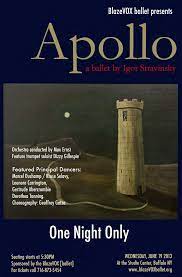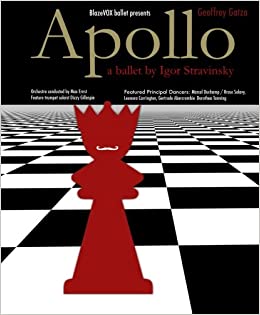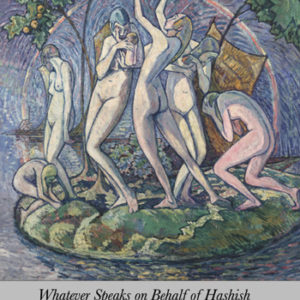Apollo: A Conceptual Poem by Geoffrey Gatza : Based upon the ballet by Igor Stravinsky
$35.00
At its heart, this book is about Marcel Duchamp but it is also about chess. It was thought for a long while that Marcel Duchamp gave up art to play professional chess. However, this was found to be not true with the revelation of his last major artwork, Étant donnés.
Marcel Duchamp is arguably one of the 20th century’s most important and influential artists. This richly illustrated publication traces the central strategies and themes of Duchamp’s work. Movement, displacement, doubling, isolation, pun and metamorphosis are the tactics used by Duchamp to estrange the ordinary.
More than just a collection of poems, this book is a readymade, taking the form of a souvenir ballet program detailing a one-night-only performance of Apollo by Igor Stravinsky to commemorate the 100th anniversary of the 1913 Armory Show in New York, in which Nude Descending a Staircase, No. 2 caused a sensation during its exhibition. At its heart, this book is about Marcel Duchamp but it is also about chess. It was thought for a long while that Marcel Duchamp gave up art to play professional chess. However, this was found to be not true with the revelation of his last major artwork, Étant donnés.
Using the form of a ballet, this work calls attention to the acts of performance, movement and choreography as well as the rhythms and balance of dance. These ideas are also found in chess. The conversation between dance and chess runs through this work. Each character is represented by a chess piece and their movements are conveyed and correlated as dance, thus the reason this book takes the form of a ballet. Marcel Duchamp, his female alter ego Rrose Sélavy, Dorothea Tanning, Leornona Carrington and Gertrude Abercrombie perform the ballet. Max Ernst leads the orchestra and Dizzy Gillespie performs a special solo.
The ten sequences in Apollo are performed in poem sections unfolding with specific functions towards the production and appreciation of the creative act. Duchamp famously said, “The creative act is not performed by the artist alone; the spectator brings the work in contact with the external world by deciphering and interpreting its inner qualifications and thus adds his contribution to the creative act.” This book establishes a more active role for the reader, who is asked to participate actively in creating meaning from the text. The work becomes collaboration between the audience, the poet, and the tradition that they’ve all inherited. The diversity of these works echoes the complexities of the subject, but together they posit something specific, the heightened relationship between the interior self and the exterior world.

Synopsis:
Opening with an introduction narrated by Duchamp’s female alter ego, Rrose Sélavy sets the stage for the evenings performance and tells the story of Tiresias.
The first tableau details the birth of Apollo and how Apollo created the game of chess for Caissa in an Ovidian style of mythic writing. This is followed in turn by the myth of how Duchamp gave up painting for other forms of more engaging art.
Playing Chess with Marcel Ducham (sic) is a dada chess poem. By assigning words to a chessboard and pieces, the play of the poem develops though a played game.
Dorothea Tanning’s painting, Birthday, is contemplated in The Twelve Hour Transformation of Clare, a story of a woman who disappears into words.
Leonora Carrington’s work is thought through in Recipe for Water, a poem of time and contemplation of relationships within a mystical space.
The Ivory Tower by Gertrude Abercrombie is enacted in a retelling of the Lady of Shallot.
Retinal Movement: A Choreography is a photo ballet of our game of chess. This is the same game used for all of the ballet’s variations, Marcel Duchamp’s game against, Frank Marshall in the 1930 Chess Olympiad. Marshall was the U.S. Chess Champion and one of the world’s strongest chess players at the time.
Duchamp Draws Rrose Sélavy is a three-act play that sets up an imaginary scene between Marcel Duchamp and his female alter ego Rrose Sélavy. They play a game of chess in the final moments before Duchamp completes his last major piece, Étant donnés.
At the end of the play, the audience is left in trapped in the tableau of Étant donnés, left in a museum. To complete the book, the ballet takes the form of a complaint letter to the director of the Albright Knox. Detailing the true story of how the author was kicked out of the museum for carrying an umbrella, the ballet ends on the outside steps with the author anticipating the redundancy of death.
Geoffrey Gatza is an award winning poet and editor. He is the author many books of poetry, including Secrets of my Prison House (BlazeVOX 2010) Kenmore: Poem Unlimited (Casa Menendez 2009) and HouseCat Kung Fu: Strange Poems for Wild Children (Meritage Press 2008), He is also the author of the yearly Thanksgiving Menu-Poem Series, a book length poetic tribute for prominent poets, now in it’s tenth year. His visual art poems have been displayed in gallery showing. OCCUPY THE WALLS: A Poster Show, AC Gallery (NYC) 2011 occupy wall street N15 For Ernst Jandl – Minimal Poems with photography from the fall of Liberty Square. And in, LANGUAGE TO COVER A WALL: Visual Poetry through its changing media, UB ART GALLERY (Buffalo, NY) 2011/12 Language for the Birds. Geoffrey Gatza is the editor and Publisher of the small press BlazeVOX. The fundamental mission of BlazeVOX is to disseminate poetry, through print and digital media, both within academic spheres and to society at large. He lives in Kenmore, NY with his girlfriend and two beloved cats.
Book Information:
· Paperback: 168 pages
· Binding: Perfect-Bound
· Publisher: BlazeVOX [books]
· ISBN: 978-1-60964-138-2
$35
Add a Review
Be the first to review “Apollo: A Conceptual Poem by Geoffrey Gatza : Based upon the ballet by Igor Stravinsky”
You must be logged in to post a comment.





Reviews(0)
There are no reviews yet.